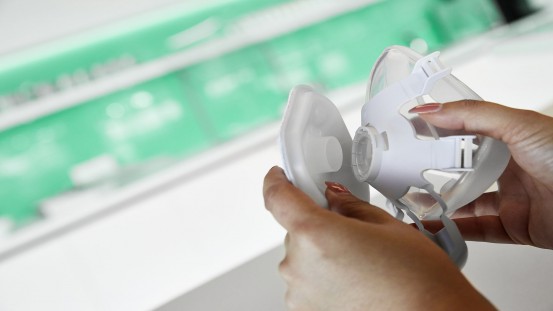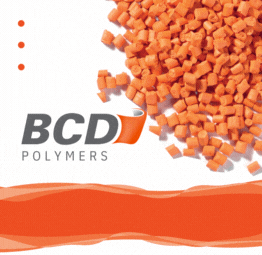"It was important to us not only to develop the mask as a product for everyday use, but also to prioritise personal protection with the additional filter," says Gerhard Böhm, Arburg Managing Director Sales. He mentioned a high level of wearing comfort, sterilisability and multiple use in terms of sustainability and resource conservation as further requirements.
Strong partners
Dr Thomas Walther, Head of Application Technology at Arburg adds: "The mask project clearly shows how the time-to-market for new product ideas can be accelerated in very special cases if all partners pool their expertise, technologies and equipment." The companies involved in the project were Sigma Engineering (LSR component and mould simulation), Polar-Form (LSR mould), Foboha and Wilhelm Weber (thermoplastic moulds), Ewikon (cold runner), Elmet (LSR dosing unit), Männer und Günter (hot runner technology), Barth Mechanik (gripper), Wacker und Borealis (material), Karl Küfner (filter design), Herrmann Ultraschall (welding technology) and Packmat (packaging technology).
Multifunctional mask
The mask itself consists of a soft LSR component, which is put over the nose and mouth, and a firm PP holder with eyelets to attach the elastic bands. The LSR masks were injected on an electric Allrounder 570 A with a clamping force of 2,000 kN and a 4-cavity mould, and removed by a Multilift V robotic system. The associated PP holder was produced on an electric Allrounder 520 E Golden Electric with a clamping force of 1,500 kN and a 2-cavity mould. The injection moulded parts were removed here by a Multilift Select robotic system.
To prevent infection in everyday life, the mask opening is closed with a cover so that the breathing air can escape downwards. A disposable filter can be placed on the opening to protect the wearer and also people in the surrounding area from coronavirus.
Filter for more safety
The filter was developed in collaboration with Karl Küfner – a company specialising in the production of filters, which has been using Arburg machines in injection moulding production for decades.
Project manager Manuel Frick, who as Arburg Sales Manager LSR designed the face mask, explains the production of the mask filter: "We used an Allrounder 470 H with a clamping force of 1,000 kN and a 4-cavity mould to produce the thin-walled filter housings made of PP. As this hybrid high-performance machine is designed for high-speed applications, we can produce the parts in a cycle time of around 5.5 seconds." This makes it possible to very efficiently produce around 2,500 housings per hour, which are then ultrasonically welded to a high-performance fleece to form the finished filter.
Customers benefit from the face mask project
The question as to whether Arburg will be producing masks for the market as an injection moulding company in future is clearly answered in the negative by Gerhard Böhm: "We do not want to earn money with the production of masks, but rather wanted to show how such high-quality products can be developed quickly and manufactured economically in series production." This project has enabled Arburg both to demonstrate its expertise in the turnkey sector and to gain interesting experience – from the design of the mask to prototype production with the Freeformer and series production with automated Allrounders. "Our customers can now also benefit fully from this. We have already received enquiries from companies who would like to start producing face masks with turnkey systems like this," enthuses the Managing Director Sales.



